|

Capt. John Prater, ALPA President; John Meenan, CEO, Air Transport Association;
and Roger Cohen, President, Regional Airline Association
|
Some code-sharing arrangements create economic pressures that force airlines to cut costs and potentially compromise safety, warned the Air Line Pilots Association, Int’l (ALPA), in comments today before the National Transportation Safety Board (NTSB).
“Code sharing is neither inherently safe nor unsafe, it’s simply a business practice,” said Capt. John Prater, ALPA’s president, following the first day of the NTSB’s Airline Code-Sharing Arrangements and Their Role in Aviation Safety Symposium. “The complexity and variety of code-share arrangements in force today make it impossible to characterize the practice itself. Factors such as a company’s commitment to safety, corporate culture, and a broad range of operational issues determine whether code sharing leads to potentially unsafe practices or not.”
“It’s clear that the airlines present at the NTSB today are putting in place safety standards that are much higher than the regulated minimums,” said Capt. Paul Rice, ALPA’s first vice-president following the symposium. “While we applaud these industry leaders, we know that not all airlines are setting their standards above those required by regulations. Setting and enforcing stronger regulatory standards remain the only certain ways to enhance safety in the air transportation system.”
In his presentation, Prater called on the industry to mine the best practices that currently exist as a result of airlines working together with labor groups and other stakeholders to ensure the highest standards of safety in code-share agreements.
In addition, the Association called on regulators to continue work to discover and codify the general types of safety risks that typically emerge in these arrangements, so that gaps can be identified and both current and new code-share participants can address them.
“If an economic practice leads to pilots being pressured to cut corners or to curtailing proven safety programs,” Prater continued, “the regulator and the airline need to take a hard look at the airline’s practices and work with pilots and other stakeholders to be certain the airline is operating to the high level of safety that the traveling public expects and deserves.”
ALPA also commended the NTSB’s ongoing activities to draw attention to pressing aviation safety issues including pilot fatigue and pilot professionalism as well as the factors flagged by NTSB’s investigations such as pilot screening, hiring, and training and the relationships between mainline and partner airlines.
“The airline industry in North America is among the most competitive in the world,” concluded Prater. “We know that creating and enforcing safety regulations, which operators must uphold and regulators must enforce, is absolutely critical to ensuring that economic competitiveness doesn’t compromise safety.”
|

